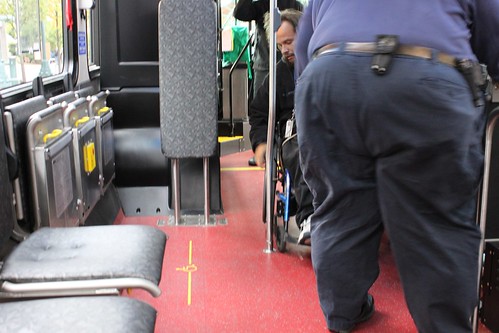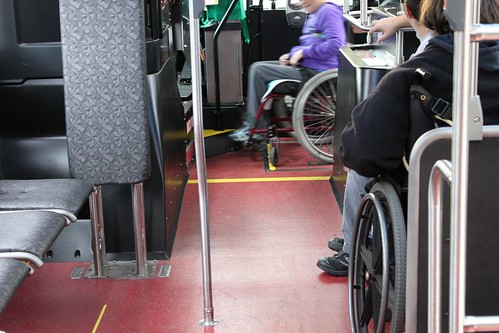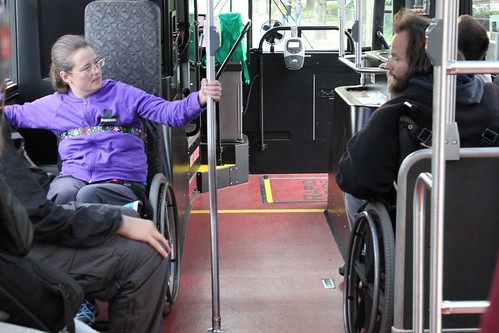This has little to do with public transit, but I would like to put it out there just the same – October is Disability Employment Awareness Month.
So it is with a touch of irony that my month started out with a phone call this morning cancelling my scheduled job interview for early this week because the interview and job locations are both inaccessible.
It is hardly the first time I have been denied a job (or a job interview) because of my disability. It has happened so often now that I'm no longer surprised. But that hardly dulls the disappointment and the general bad feelings that come along with this every time it happens.
One of the previous potential employers was outright discriminatory by saying, "We don't hire people in wheelchairs." That in itself is likely violating several discrimination laws. I could have reported him but if you are someone seeking a job, would you try to ruffle some feathers and cause future employers to wonder whether you are a loose cannon?
The more common situation is when they call you, schedule you for an interview, and then either decide or realize that they cannot accommodate you or make the workplace (or even interview location) accessible.
To be honest, that is what bothers me more than the overt discrimination I mentioned earlier.
It bothers me because it shows that there is a real lack of awareness of what is needed to make a workplace accessible. For example, if you see on a resume that the potential employee has first-hand experience with disability issues, it might not be a bad idea to consider whether your workplace is accessible or not. Or you can even send an e-mail to the potential employee, stating that it is for determining whether or not accommodations are possible.
But phoning up the employee, asking him/her the standard screening questions, scheduling an interview time, etc. but not even checking or considering the accessibility issues that are obviously involved – that is when it feels that there is a big gap between awareness and understanding. And to be told, "We have to cancel the interview; we can't hire you because our workplace isn't accessible" gives a much worse vibe than a call earlier saying, "We just want to check whether we can accommodate you. Can you please describe your abilities?"
With the latter quote, I would like to segway into the next biggest issue that I have found – the assumption of one's abilities. I have had previous interviews (not screening questions) where we did not touch on any of my job abilities at all, but rather what I can and cannot do as a person with a disability.
There were a lot of assumptions about that. Some of them sound like a bad joke. For example, I have been asked whether I can use a computer. Obviously I can: I run not only this blog but several others, my background is very much based in online work and multimedia, and I have full use of my hands and upper body. Despite my insistence, some employers were not convinced that I could use a computer because of my disability. Like I said, it sounds like a bad joke but it has happened before.
It is funny how I can take public transit as a wheelchair user going from the western edge of Metro Vancouver to the eastern edge all the way to Maple Ridge (something some able-bodied people would be hard-pressed to do without collapsing from exhaustion), but somebody will assume that I can't press a few keys on a computer!
If you are unsure of whether someone with a disability has the capability to do something, ask him/her. Think of it this way – if the person knows that he/she cannot do it, then why apply for the job in the first place? If someone needs accommodations for using a computer or something else, he/she will mention it; that person might even know which organizations are available to help the company in this process! I certainly do, and I don't need accommodations beyond ramps and elevators.
The key point in all of this is disability
awareness. Awareness does not mean bending over backwards to make sure someone with a disability gets in the workplace, but rather being aware of what is expected when you encounter a potential employee with a disability, as well as what attitudes both sides should bring to the table.
To recap...
It is NOT offensive to contact the applicant to ask about his/her abilities, but it CAN be offensive if you book an interview time and make it appear as if things will go ahead before realizing you should have done that in the first place. Doing the latter makes the person feel like the employer is unaware about or unsympathetic to the idea of workplace inclusion and adds to the feeling that your company is inadvertently discriminating against people with disabilities.
Do NOT make assumptions about one's abilities. We know our own abilities, just like how most job applicants know if they are qualified for a job before applying. If there is an issue that could play a factor, we will mention it. This applies in real life as well.
The final and most important thing I will mention is if your company has an "equal opportunity employer" statement, be sure you follow it. While I am not a big fan of these statements (since ALL employers should technically be equal opportunity employers by law), there is nothing worse than seeing a statement like that and then seeing it ignored or violated. It makes the statement meaningless and simply a fashion accessory for the company.
This has been a rant by yours truly. Now back to your regularly scheduled programming.






